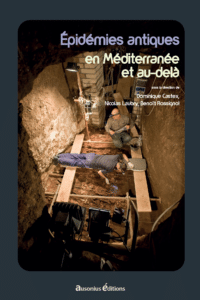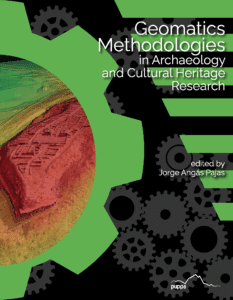UN@ est une plateforme d'édition de livres numériques pour les presses universitaires de Nouvelle-Aquitaine
Catégorie : Archéologie
par Jorge Angás
La géomatique transforme la recherche en archéologie et patrimoine culturel. Avancées méthodologiques, numérisation, jumeaux numériques et principes FAIR.
Les contributions illustrent l’ensemble des disciplines aujourd’hui impliquées dans l’histoire des maladies infectieuses, c’est-à-dire à l’interface d’une part, des sciences humaines et sociales, telles l’histoire et l’archéologie, et d’autre part, de la biologie.
“Les épidémies sont des sujets maudits pour les historiens”. Au début de l’épidémie de Covid-19, l’affirmation de l’historien de la médecine Guillaume Lachenal avait assurément de quoi étonner.
par Benoît Rossignol
Une partie importante des débats historiographiques récents au sujet des épidémies antiques concerne leur impact supposé, et en particulier la gravité exceptionnelle ou non de certaines d’entre elles.
par Thierry Bardinet
Les anciens Égyptiens divisaient l’année en 360 jours et en 12 mois égaux de 30 jours répartis en 3 saisons de 4 mois. Les mois étaient eux-mêmes divisés en trois périodes de 10 jours, représentées par des divinités astrales, les décans, des étoiles observables dans le ciel qui présidaient à la fois aux divisions du temps et aux destinées des hommes.
par Christer Bruun
Historians strive to uncover the reasons behind historical events and historical change. Among what can be called traditional explanations and causes, in the sense that they can be found already in the ancient sources themselves …

par Kevin Bouillot
Au IIe s. p.C., la cité lydienne de Césarée Troketta consulta le dieu Apollon dans son sanctuaire oraculaire de Claros, à propos d’une épidémie qui la frappait. Le dieu répondit par ces vers, avant de recommander un remède contre ce “mal puissant” (κραταιὸν πῆμα).
Parmi toutes les catacombes chrétiennes romaines, celle des saints Pierre et Marcellin représente un cas emblématique qui tient en grande partie à la très bonne conservation de ses peintures murales, mais aussi à l’opportunité qu’elle offre d’accéder à un immense cimetière …
Les maladies infectieuses ont profondément marqué l’histoire des sociétés antiques. En rendent compte, notamment, une multitude de sources textuelles, tels les écrits médicaux de Galien, Celse ou Soranos, ou les récits qu’ont livrés Tite-Live ou Dion Cassius de grandes crises épidémiques.
En 2008, une fouille préventive a conduit à la découverte de plusieurs fosses contenant des restes humains au pied du quadriportique du grand temple du complexe cultuel de Saint-Martin-au-Val à Chartres (Autricum), dans le département d’Eure-et-Loir.
par Claire Sotinel
L’épidémie qui frappe l’empire à partir de 541 a suscité l’effroi des contemporains. Dans une société habituée à toutes sortes de désastres, elle était remarquable par sa létalité, par la brutalité de ses symptômes et, rapidement, par sa capacité à se déplacer et à revenir selon des rythmes imprévisibles.
par Sophie Lalanne
Le mauvais œil, l’ophtalmie, la naissance de l’amour, la jaunisse et le pouvoir maléfique d’un reptile appelé basilic : tels sont les cinq phénomènes qu’Héliodore d’Émèse met en parallèle, dans la bouche du savant Calasiris, pour expliquer la maladie qui frappe Théagène et Chariclée, dans son roman intitulé Les Éthiopiques.


